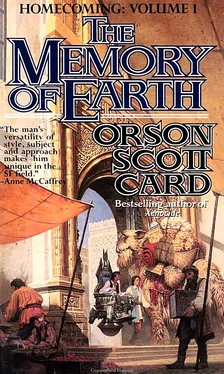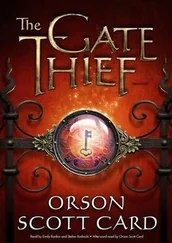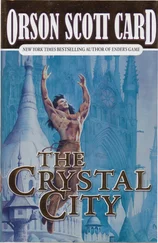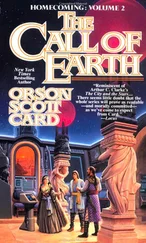Orson Card - The Memory of Earth
Здесь есть возможность читать онлайн «Orson Card - The Memory of Earth» весь текст электронной книги совершенно бесплатно (целиком полную версию без сокращений). В некоторых случаях можно слушать аудио, скачать через торрент в формате fb2 и присутствует краткое содержание. Жанр: Фантастика и фэнтези, на английском языке. Описание произведения, (предисловие) а так же отзывы посетителей доступны на портале библиотеки ЛибКат.
- Название:The Memory of Earth
- Автор:
- Жанр:
- Год:неизвестен
- ISBN:нет данных
- Рейтинг книги:5 / 5. Голосов: 1
-
Избранное:Добавить в избранное
- Отзывы:
-
Ваша оценка:
- 100
- 1
- 2
- 3
- 4
- 5
The Memory of Earth: краткое содержание, описание и аннотация
Предлагаем к чтению аннотацию, описание, краткое содержание или предисловие (зависит от того, что написал сам автор книги «The Memory of Earth»). Если вы не нашли необходимую информацию о книге — напишите в комментариях, мы постараемся отыскать её.
The Memory of Earth — читать онлайн бесплатно полную книгу (весь текст) целиком
Ниже представлен текст книги, разбитый по страницам. Система сохранения места последней прочитанной страницы, позволяет с удобством читать онлайн бесплатно книгу «The Memory of Earth», без необходимости каждый раз заново искать на чём Вы остановились. Поставьте закладку, и сможете в любой момент перейти на страницу, на которой закончили чтение.
Интервал:
Закладка:
Never alone, because Dolltown was a place for company and fellowship, a place for sitting in a crowded audience and watching dances and plays, or listening to recitations and concerts. Now, though, Nafai was coming to Dolltown as an artist, not to be part of the audience. It wasn't fellowship he was looking for, but vocation.
The sun was still up, so the streets of Dolltown weren't crowded. Dusk would bring out the frolicking apprentices and schoolboys, and full dark would call forth the lovers and the connoisseurs and the revelers. But even now, in the afternoon, some of the theatres were open, and the galleries were doing good business in the daylight.
Nafai stopped into several galleries, more because they were open than because he seriously thought he might apprentice himself to a painter or a sculptor. Nafai's skill at drawing was never good, and when he tried sculpture as a child his projects always had to have titles so people could tell what they were supposed to be. Browsing through the galleries, Nafai tried to look thoughtful and studious, but the artsellers were never fooled-Nafai might be tall as a man, but he was still far too young to be a serious customer. So they never came up and talked to him, the way they did when adults came into the shops. He had to glean his information from what he overheard. The prices astonished him. Of course the cost of the originals was completely out of reach, but even the high-resolution holographic copies were too expensive for him to dream of buying one. Worst of all was the fact that the paintings and sculptures he liked the best were invariably the most expensive. Maybe that meant that he had excellent taste. Or maybe it meant that the artists who knew how to impress the ignorant were able to make the most money.
Bored at last with the galleries, and determined to see which art should be the channel for his future, Nafai wandered down to the open theatre, a series of tiny stages dotting the broad lawns near the wall. A few plays were in rehearsal. Since there was no real audience yet, the sound bubbles hadn't been turned on, and as Nafai walked from stage to stage, the sounds of more distant plays kept intruding into every pause in the one close at hand. After a while, though, Nafai discovered that if he stood and watched a rehearsal long enough to get interested, he stopped noticing any other noises.
What intrigued him most was a troupe of satirists. He had always thought satire must be the most exciting kind of play, because the scripts were always as new as today's gossip. And, just as he had imagined, there sat the satirist at the rehearsal, scribbling his verse on paper-on paper- and handing the scraps to a script boy who ran them up to the stage and handed them to the player that the lines were intended for. The players who weren't onstage at the moment were either pacing back and forth or hunched over cm the lawn, saying their lines over and over again, to memorize them for tonight's performance. This was why satires were always sloppy and ill-timed, with sudden silences and absurd non sequiturs abounding. But no one expected a satire to be good-it only had to be funny and nasty and new.
This one seemed to be about an old man who sold love potions. The masker playing the old man seemed quite young, no more than twenty, and he wasn't very good at faking an older voice. But that was part of the fun of it-maskers were almost always apprentice actors who hadn't yet managed to get a part with a serious company of players. They claimed that the reason they wore masks instead of makeup was to protect them from reprisals from angry victims of satire-but, watching them, Nafai suspected that the mask was as much to protect the young actor from the ridicule of his peers.
The afternoon had turned hot, and some of the actors had taken off their shirts; those with pale skin seemed oblivious to the fact that they were burning to the color of tomatoes. Nafai laughed silently at the thought that maskers were probably the only people in Basilica who could get a sunburn everywhere but their faces.
The script boy handed a verse to a player who had been sitting hunched over in the grass. The young man looked at it, then got up and walked to the satirist.
"I can't say this," he said.
The satirist's back was to Nafai, so he couldn't hear the answer.
"What, is my part so unimportant that my lines don't have to rhyme?"
Now the satirist's answer was loud enough that Nafai caught a few phrases, ending with the clincher, "Write the thing yourself!"
The young man angrily pulled his mask off his face and shouted, "I couldn't do worse than thisl"
The satirist burst into laughter. "Probably not," he said. "Go ahead, give it a try, I don't have time to be brilliant with every scene."
Mollified, the young man put his mask back on. But Nafai had seen enough. For the young masker who wanted his lines to rhyme was none other than Nafai's brother Mebbekew.
So this was the source of his income. Not borrowing at all. The idea that had seemed so clever and fresh to Nafai-apprenticing himself in an art to earn his independence-had long since occurred to Mebbekew, and he was doing it. In a way it was encouraging-if Mebbekew can do it, why can't I?-but it was also discouraging to think that of all people, Nafai had happened to choose Mebbekew to emulate. Meb, the brother who had hated him all his life instead of coming to hate him more recently, like Elya. Is this what I was born for? To become a second Mebbekew?
Then came the nastiest thought of all. Wouldn't it be funny if I entered the acting profession, years after Meb, and got a job with a serious company right away? It would be deliciously humiliating; Meb would be suicidal.
Well, maybe not. Meb was far more likely to turn murderous.
Nafai was drawn out of his spiteful little daydream by the scene on the stage. The old potion-seller was trying to persuade a reluctant young woman to buy an herb from him.
Put the leaves in his tea Put the flower in your bed
And by half past three
He'll be dead-I beg your pardon,
Just a slip of the tongue.
The plot was finally making sense. The old man wanted to poison the girl's lover by persuading her that the fatal herb was a love potion. She apparently didn't catch on-all characters in satire were amazingly stupid- but for other reasons she was still resisting the sale.
I'd sooner be hung
Than use a flower from your garden.
I want nothing from you.
I want his love to be true.
Suddenly the old man burst into an operatic song. His voice was actually not bad, even with exaggeration for comic effect.
The dream of love is so enchanting!
At that moment Mebbekew, his mask back in place, bounded onto the stage and directly addressed the audience.
Listen to the old man ranting!
They proceeded to perform a strange duet, the old potion-seller singing a line and Mebbekew's young character answering with a spoken comment to the audience.
But love can come in many ways! (I've followed him for several days.)
One lover might be very willing! (I know he plots her lover's killing.)
The other endlessly delays!
(Listen how the donkey brays!)
Oh, do not make the wrong decision!
(I think I'll give this ass a vision.)
When I can take you to your goal!
(He'll think it's from the Oversoul.)
No limits bind the lover's game.
(A vision needs a little flame...)
No matter how you win it,
Because your heart is in it,
You'll love your lover's loving still the same,
A vision from the Oversoul. Flame. Nafai didn't like the turn this was taking. He didn't like the fact that the old potion-seller's mask had a wild mane of white hair and a full white beard. Was it possible that word had already spread so for and fast? Some satirists were famous for getting the gossip before anyone else-as often as not, people attended the satires just to find out what was happening-and many people left the satires asking each other, What was that really about?
Читать дальшеИнтервал:
Закладка:
Похожие книги на «The Memory of Earth»
Представляем Вашему вниманию похожие книги на «The Memory of Earth» списком для выбора. Мы отобрали схожую по названию и смыслу литературу в надежде предоставить читателям больше вариантов отыскать новые, интересные, ещё непрочитанные произведения.
Обсуждение, отзывы о книге «The Memory of Earth» и просто собственные мнения читателей. Оставьте ваши комментарии, напишите, что Вы думаете о произведении, его смысле или главных героях. Укажите что конкретно понравилось, а что нет, и почему Вы так считаете.









